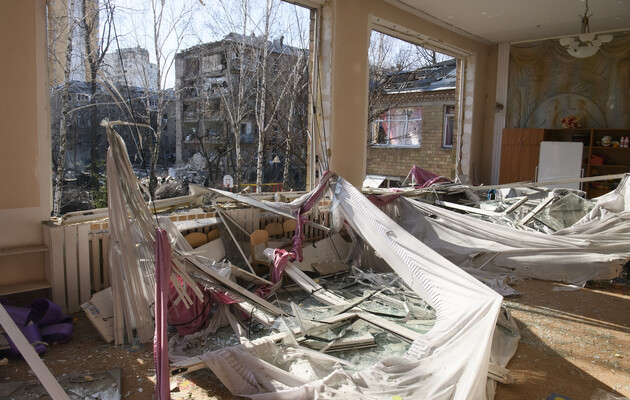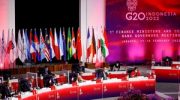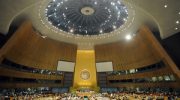Sanctions have not prevented the Russian army from invading, but combined with international patience, they could force the Kremlin to pay for the damage.

President Joe Biden has promised to make sure that Vladimir Putin “pays a very high price” for invading Ukraine. Until now, this price has included financial losses due to sanctions and possible criminal liability for war crimes. But this should not be the only thing.
If Ukraine can repel Putin's military offensive and maintain its independence, it will need large infusions of cash to rebuild and rebuild. And the international community must force Russia to pay all its bills.
Evan Kridl , a professor of international law at William & Mary Law School, writes about this on the pages of Politico. Historically, the victors of wars have always demanded financial reparations from defeated aggressors. These payments were usually imposed at the risk of brute force. For example, with Germany after the First and Second World Wars. The war in Ukraine is another matter. Even if Russia decides to reduce its losses and retreat, Ukraine will not be able to force it to pay compensation for everything it destroyed in Kherson, Kharkov, Kiev, Mariupol and other cities.
However, there is a way to make Putin pay. After the Russian invasion, the United States and its partners froze the sovereign assets of the Russian government, as well as the personal offshore wealth of Putin , his aides and oligarchs. This blocked pile of money now includes the reserves of the Russian Central Bank, private bank accounts, real estate and expensive yachts around the world. In total, all these frozen assets are estimated at hundreds of billions of dollars. This is a very good amount that can be used to help Ukraine.
Read also: Two more yachts of Putin's oligarchs arrested
With this in mind, Oleg Ustenko , an economic adviser to the Ukrainian president, and Simon Johnson , an economist at the Massachusetts Institute of Technology, are urging the United States and its partners to confiscate frozen Russian assets and redirect them to needy Ukrainians. Other political analysts have more concretized this idea. All these ideas are justified from a humanitarian and economic point of view. But in the political and legal field, they have no chance.
The transfer of Russian assets to the Ukrainians is politically impossible, because it will destroy one of several instruments by which the international community is putting pressure on Russia to stop the military offensive. So far, the freeze on assets has not stopped Putin . But this does not mean that it will not help bring the decision to an end in the future. It is also fundamental that the confiscation of Russian assets violates international law. Freezing assets in international law is called “countermeasures”. These are temporary coercive acts designed to force other countries to make their international obligations. International law allows the United States and its allies to freeze Russian assets as a temporary countermeasure, provided that these assets are retained so that they can be returned when Moscow resumes its obligations. At the same time, the permanent confiscation proposed by Ustenko and Johnson would be illegal expropriation. If the United States and its partners want to send a signal that international law should be respected, then transferring Russian assets to Ukraine is a bad idea.
Fortunately, there is another way the United States and other Western countries can use Russia's frozen wealth to ease Ukraine's situation. They may refuse to unfreeze their assets until Putin pays reparations. According to international law, Moscow is obliged to compensate Ukraine for the damage caused by the war. There are a number of ways in which Russia could meet this demand. It can negotiate and agree on a lump sum payment of a comprehensive amount. It can set up a bilateral court in cooperation with Ukraine, such as the Iranian-American court. They can turn to international organizations for help in setting up a special body to meet all claims, including the UN Compensation Commission, which is considering civil lawsuits following the illegal invasion of Iraq and the occupation of Kuwait in the early 1990s. In each of these cases, the frozen assets can be used to pay compensation to Ukraine.
World leaders do not seem to have considered all of these options. Biden and his advisers insisted on international sanctions solely to curb Russian aggression. But asset freezes and other sanctions have not stopped Putin from destroying Ukrainian cities. And they are unlikely to persuade the Russian autocrat to abandon the occupied Donbass, let alone Crimea. Moreover, as soon as Ukraine and Russia agree to end the fighting and resolve their territorial disputes, sanctions will lose their logic as a deterrent. If sanctions disappear as soon as the war is over, Russia will be able to avoid responsibility. Redirecting international sanctions to achieve reparations will make them more powerful.
The United States and its allies must send a clear signal that the more damage Russia does to Ukraine, the more it will have to pay before sanctions are lifted. Pegging sanctions to reparations will allow Moscow to refrain from rocket fire. It will also provide a legal justification for the United States to maintain sanctions after the war. There will also be a powerful mechanism to force Russia to finance the reconstruction of Ukraine.
This strategy of collecting military reparations may seem strange because it requires Russian cooperation. It is very difficult to imagine Putin agreeing to pay enough to compensate for all the damage caused by the war, as required by international law. Instead of acknowledging that his so-called “special operation” in Ukraine violates international law, Putin may choose to lose his country's frozen wealth by blaming foreign enemies.
Read also: Russia has warned that it will steal products without the permission of copyright holders
But patient perseverance can bear unexpected fruit. As long as sanctions are in place, Russia will seek to attract foreign capital to pay its bills and support its exploded financial system and economy. Over time, Russia will feel increasing pressure, which will force it to start negotiations on easing sanctions. And this will improve the chances that she will agree to pay reparations. International sanctions have not prevented Putin 's army from invading Ukraine. But if the international community is patient and united in defending international law, it could force the Russian autocrat to pay for his illegal war and compensate Ukraine for the damage done with hard currency.
See special topic: US sanctions have frozen Russia's assets and projects for tens of billions of dollars The United States has hit the first package of severe restrictions on Russia's most sensitive financial zones. Biden has enacted a decree on sanctions against the self-proclaimed “DPR” and “LPR” Russia is not yet affected by these sanctions. The US Senate views Russia's cyberattacks against Ukraine as a “trigger” for sanctions – Politico Kiev may receive “millions of dollars” in additional funding to strengthen cybersecurity. Biden is ready to impose personal sanctions against Putin personally . The United States will also significantly increase the contingent of its troops on NATO's eastern borders. Biden's attitude toward Russia has become too lenient – The National Interest “Surrender” to Nord Stream 2 is a US mistake.


